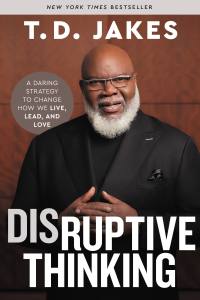Disruptive Thinking: What is it, why have it, and why it’s so difficult

For most of our lives, we are encouraged to trudge along the well-worn paths of those who have come before us. We learn the rules – in our families, in our schools, in our workplaces, in our churches, but in order to experience a true breakthrough, we must disrupt the status quo. The new book from Bishop Jakes, Disruptive Thinking, will show you the mindset and the tools you need to create groundbreaking and meaningful change in your own life and in the world around you. In order to get started, we must analyze what is disruptive thinking, why have it, and why it’s so difficult.
1. WHAT IS DISRUPTIVE THINKING
“How does disruption affect the way we think, how we see the world and its possibilities? We emerged from that previous era of enormous disruption with untold discoveries, transformative businesses, earth-shaking music and art and literature. We are now at a similar inflection point as a society, as a global community. How are we going to take the disruption we are seeing and use it as an opportunity to create radical change? How can we become disruptive thinkers at a time when the vortex of decadence threatens the very existence of our society?
What it all comes down to is this: How do we respond to trouble? How do we respond to calamity and chaos? Will we be so orthodox in our thinking that we don’t explore options beyond the veil of human acceptance—or will we jump the fence? Disruptive thinking is about finding a solution and a path toward it, rather than joining a gang and continuing a debate that might outlive you.”
2. WHY DO WE NEED DISRUPTIVE THINKING?
“Why do we need disruptive thinking now? Ask that white rural man, who is staggered that his job prospects have disappeared, with no relief on the horizon. Ask that Black mother trying to figure out how to feed her family as her wages buy less with each passing month. Ask the worker gazing out the office window watching her CEO slide into the helicopter to ferry him to his private jet—as her health insurance coverage is slashed even further.
Trust has been shredded. Anger is the new American pastime. If we are to be saved, we desperately need to summon the power of disruptive thinking. So, as we stand together on the precipice of the cliff, staring down into a valley teeming with unrelenting misery, we are all faced with the question for the ages: What are we going to do about it?What disruption are we willing to make in our lives to bring about change?”
3. WHY DISRUPTIVE THINKING IS SO DIFFICULT
The reality is that we all have invisible fences in our lives, quietly working to hold us back, to make us afraid, to curtail our attempts at boldness. To stop us from being disruptive. The fears and insecurities that we carry around with us are invisible fences, carefully constructed and reinforced by the negativity of others, woven together to form an intimidating barbed-wire barrier that continues to imprison us.
No matter our background, race, or socioeconomic class, we all have fences to jump. In order to jump them successfully, we need to figure out what they are built of. Understanding our fences and deconstructing them is so crucial to moving forward. We can’t have construction without deconstruction.
*A NEW YORK TIMES BESTSELLER!*
Think differently and find the courage to challenge the status quo with this mindset-shifting guide to meaningful change.
For most of our lives, we are encouraged to trudge along the well-worn paths of those who have come before us. We learn the rules – in our families, in our schools, in our workplaces, in our churches – and most of the messages we receive tell us that following the rules will allow us to arrive at the lives we desire.
But when change becomes not only desirable but also urgently necessary, this way of being no longer serves us. In fact, in every human endeavor, every major leap forward, has involved a cataclysmic challenge to existing ways of thinking and being. Breakthroughs, by definition, run against the grain and almost always encounter skepticism and opposition.
In this book for leaders, thinkers, doers, and creators, Bishop T.D. Jakes illuminates the pathway to encouraging and unleashing disruptive thinking and provides the wisdom and practical skills we need to evolve our most original and potentially transformational ideas from vision to reality. Through his insight into how our minds and emotions work and through his experiences as a pastor, entrepreneur, and creator, Bishop Jakes leads us into a new way of relating to and transforming the world around us for good. Disruptive Thinking will show you the mindset and the tools you need to create groundbreaking and meaningful change in your own life and in the world around you.
A Study Guide is also available for purchase.

